A 3-0-0 week with wins over Tampa Bay, Florida and Vancouver followed up by an 0-2-1 week against the 27th, 28th, and 30th-place teams: The 2019-20 Toronto Maple Leafs.
Your game in ten:
1. Before we get into the game, let’s start here: The only conclusion I can draw about this road trip is that we continue to have no idea what Leafs team is going to show up on any given night regardless of the opponent. Fans and media keep searching for those “rallying point” wins that launch this team back into the elite stratosphere where many feel it belongs based on the Leafs’ core talent, but so far this season, it has proven — time and again — to be a case of “two steps forward, one step back” with this club.
The team could just as easily return home, receive a big boost in the form of Morgan Rielly returning, and pick up a convincing win against an elite opponent in the Lightning on Tuesday. They struggled on the road this week against three teams that were aware of their skill deficit against the Leafs and built a gameplan around it — they also got very good goaltending— but the Leafs have matched up pretty well mono e mono against Tampa in recent seasons, including as recently as a few games ago. Where does that leave this team for the playoffs? Who knows? We’ll just have to watch.
2. The other thing worth pointing out: I don’t want to diminish this weakness entirely because their struggles to get results in these situations probably hints at larger work ethic concerns, but there are no back-to-back games in the playoffs. There are also no shootouts. The Leafs are exceptionally terrible at both again this year, and it again cost them any chance at home-ice advantage in the playoffs. They’ve collected one out of a possible six extra points in shootouts. They’ve picked up seven out of a possible 26 points in back-to-back situations. They’ve beaten one team in a tired situation vs. a rested opponent: The Detroit Red Wings in a game where, while the Leafs played well, Detroit’s starting goalie got hurt and Jonathan Bernier entered the game with the flu.
3. Getting off to a slow start and conceding an early goal in a tired situation on the road is a really bad recipe for getting a result. Sometimes a team coming into a game less than 24 hours after its previous one can get the early jump on a rested opponent, but the Leafs never seem to enter these nights all that motivated, energetic, or prepared. The Ducks carried 67% of the shot attempts, 72% of the shots on goal, and 76% of the expected goals at even-strength in the first period of this game. The Leafs were losing the lion’s share of the puck races and battles as Ducks played a simple and effective game, putting pucks in deep consistently, working the Leafs’ D, jamming them up in the neutral zone, and forcing the Leafs to work for their offense.
4. I’ve rambled ad nauseam in this space about how bad this team is in back-to-back situations the past couple of years. It seems to come down to the team leaning on its skill to find its way into games in a situation where it’s going to require a more simplified, nose-to-the-grindstone approach. These games are a grind — like getting out of the bed on time in the morning after a late night. It doesn’t matter how talented at your job you might be if you’re missing the will to wake up with your alarm, turn on the coffee machine, and battle through.
Leafs fans fleeing the winter travel well to these trips (as they do in most places) — it’s great; it’s also fuel for the other teams — and all of these teams were playing spoiler under either new coaches (LA and SJ) or first-year coaches (ANA). They weren’t going to just roll over. The Leafs got handily outworked in both San Jose and Anaheim.
5. A good example of the Leafs’ stubbornness about playing the simple game more effectively in these sorts of situations came late in the second period on a shift where the Matthews line tilted the ice successfully and were working the puck around in the offensive zone for a good spell. With Zach Hyman battling at the net front, Auston Matthews and Mitch Marner tried to set each other up multiple times for fancy one-time plays high in the zone (which they fumbled and eventually turned the puck over, ending the possession) instead of just getting pucks at the net and charging downhill.
6. It even bleeds into their power play, which should be a saving grace in tired situations like this for a team with the Leafs’ man-advantage power but often isn’t. It was stagnant and predictable, with limited player movement and puck speed, and no real second opportunities generated after the initial shot. There are some adjustments that need to be made on entries (Morgan Rielly is really going to help here) and also in terms of the opposition PKs playing Matthews’ shot more aggressively and leaving Barrie and Marner extra space knowing the threat isn’t really there (not a new issue).
7. Mitch Marner said after the game, “Teams are playing us now knowing Matts is the only real shooter up high.” At some point, doesn’t an $11 million player have to take the onus on himself to make himself a real shooting threat?
8. The majority of the underwhelming effort on this trip falls on the players — and it’s definitely not helped by the absence of leaders like Jake Muzzin and Morgan Rielly — but there are some questions to be asked of the coaching staff as well. Sheldon Keefe has done a lot of good things since taking over as head coach, but the inconsistency to the team’s work rate and its failure to grind out results in back-to-back situations has remained a constant all year.
Keefe’s ice time distribution that had five Leafs under 10 minutes in Los Angeles — six under 11 —in a back-to-back probably does not help matters in this situation. It doesn’t help to lean on players that clearly just don’t have it that night — particularly Mitch Marner, who played over 22 minutes despite turning pucks over constantly and taking a selfish penalty that would’ve ended the game if not for an amazing Jack Campbell glove save on Ryan Getzlaf.
The Leafs’ depth lines are no world beaters — and that speaks to the injuries of Ilya Mikheyev and Andreas Johnsson and also possibly to some roster construction shortcomings — but there is something to be said for empowering them to make the difference you need them to make.
Jason Spezza was skating really well at points in this game. Kyle Clifford destroyed David Backes and dropped the gloves for the team, and he also had a few half-chances around the net. Spezza played eight minutes — with nearly two of those minutes coming on the power play — while Clifford played six and change. Beyond that, the messaging around throwing someone like Marner over the boards repeatedly without any measure of accountability for his carelessness with the puck and the selfish penalty he took just seems a little off.
9. We can now officially eliminate bad goaltending from the go-to explanation about the team’s back-to-back struggles. Similar to the loss in Montreal behind a tired team, Jack Campbell kept giving the Leafs second lives in this game. I liked how he battled through a few of his shakier moments in the Leaf net to date — a couple of pucks got away from him on fairly routine stops — and came up with big saves subsequently. In terms of run support, the Leafs have only given him two goals total in his two back-to-back starts to date.
10. Lastly, shout out to William Nylander for being the team’s best player on this trip. His conditioning and competitiveness show through in times like this (three games in four nights) and he was willing the Leafs into back it at various points in the game, including his one-man effort to strip a puck and bury one late. I would’ve reunited Matthews and Nylander as an in-game adjustment if I were Keefe.
Nylander finally gets the Leafs on the board. 2-1. #LeafsForever pic.twitter.com/7cIq0F9Tzp
— Maple Leafs Hotstove (@LeafsNews) March 7, 2020
Game Flow: 5v5 Shot Attempts
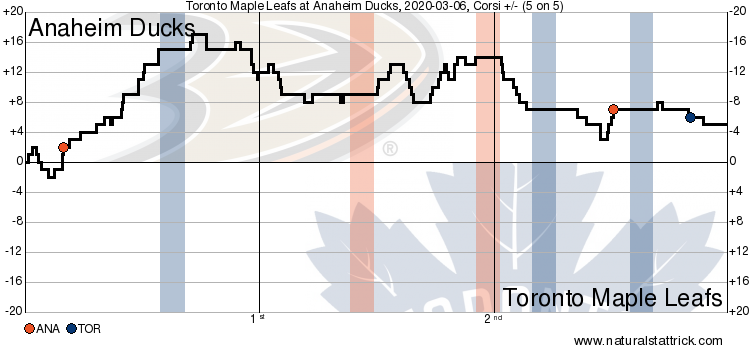
Heat Map: 5v5 Shot Attempt Locations
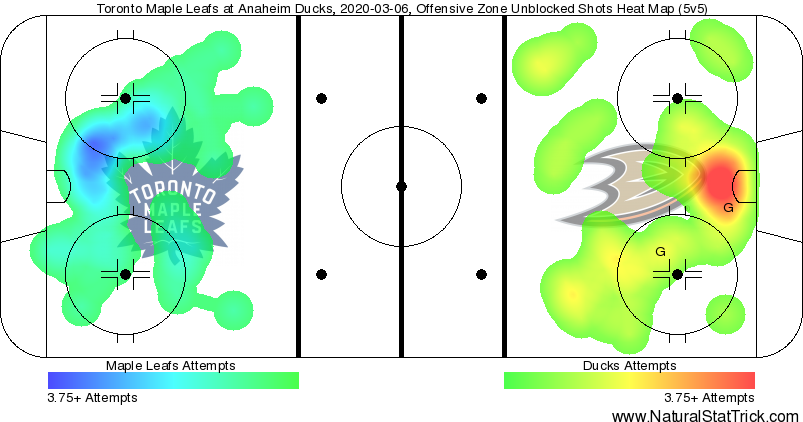


![Sheldon Keefe on the Maple Leafs’ struggling power play: “[We’ve scored] one out of 11 high-danger chances in tight to the net… We have been in those spots and haven’t converted” Sheldon Keefe, playoff press conference](https://mapleleafshotstove.com/wp-content/uploads/2024/04/keefe-pc-game-3-218x150.jpg)

![Jim Montgomery Post Game, Bruins 4 vs. Leafs 2: “[Marchand] still manages to get under people’s skin, yet he doesn’t cross the line” Jim Montgomery, Boston Bruins post game](https://mapleleafshotstove.com/wp-content/uploads/2024/04/jim-monty-pg-to-218x150.jpg)
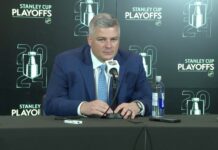

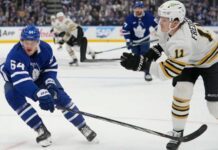



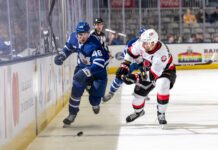


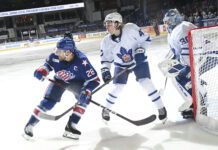










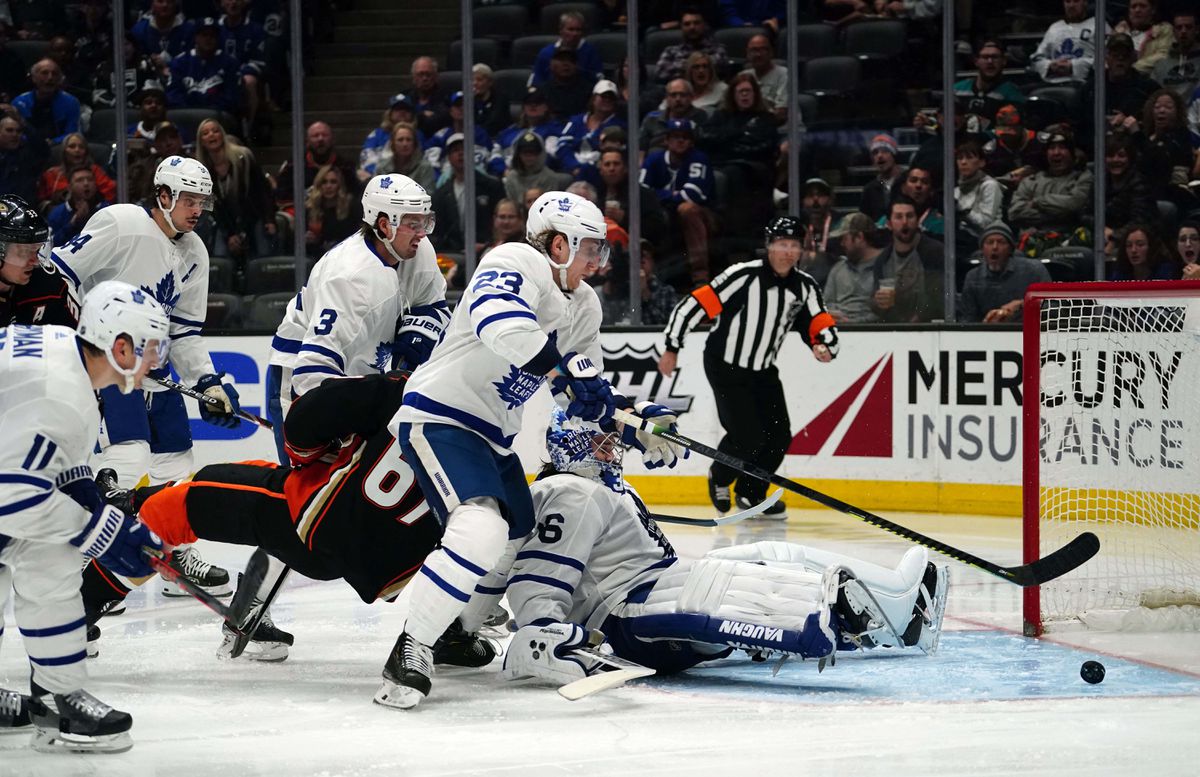
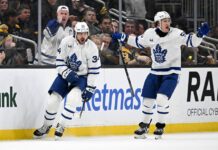
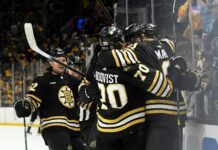



![Sheldon Keefe on the Maple Leafs’ struggling power play: “[We’ve scored] one out of 11 high-danger chances in tight to the net… We have been in those spots and haven’t converted” Sheldon Keefe, playoff press conference](https://mapleleafshotstove.com/wp-content/uploads/2024/04/keefe-pc-game-3-100x70.jpg)



![Jim Montgomery Post Game, Bruins 4 vs. Leafs 2: “[Marchand] still manages to get under people’s skin, yet he doesn’t cross the line” Jim Montgomery, Boston Bruins post game](https://mapleleafshotstove.com/wp-content/uploads/2024/04/jim-monty-pg-to-100x70.jpg)

